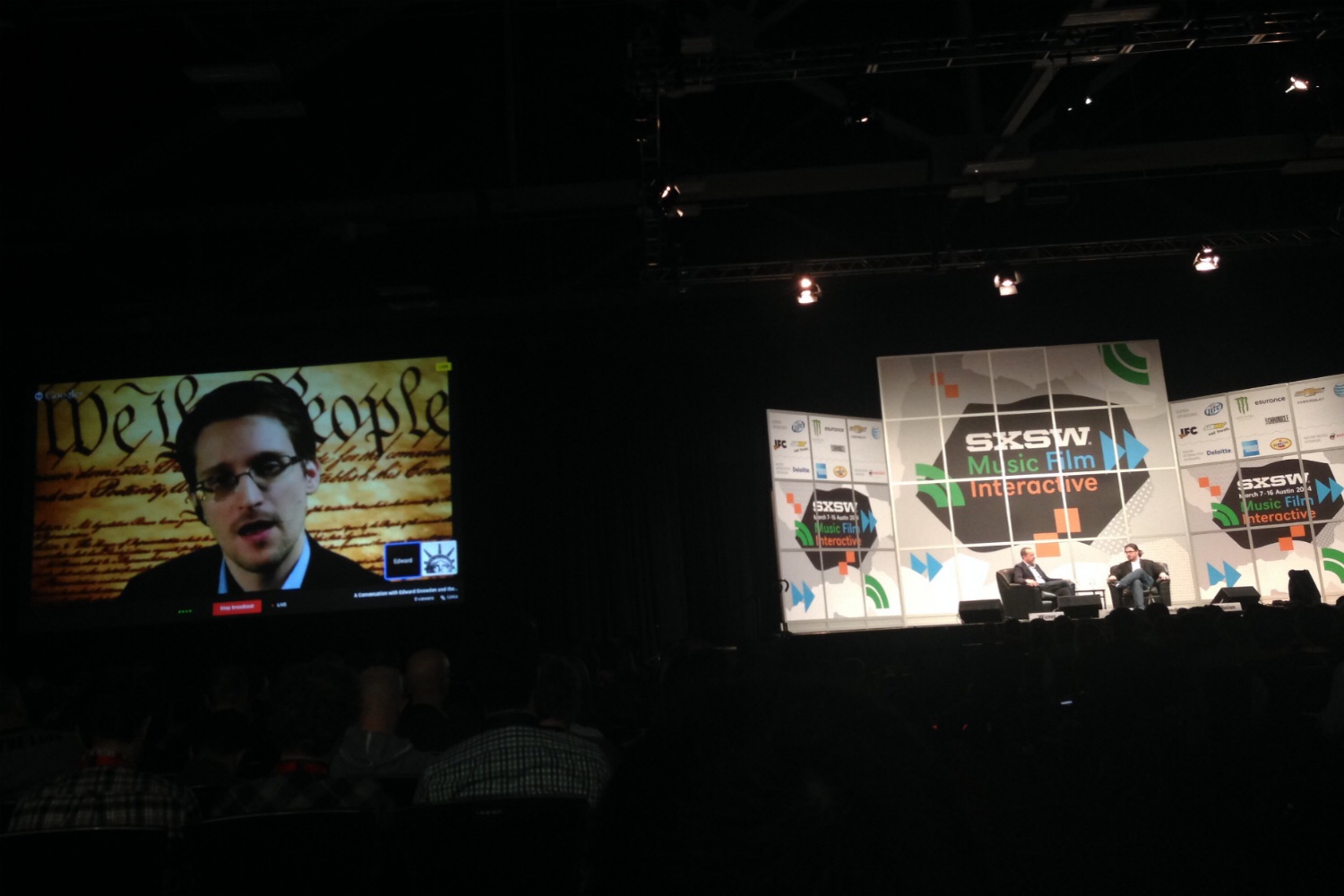
Of all the hundreds of interviews, panels and other conversations happening at South by Southwest Interactive in Austin, perhaps the most newsworthy one features somebody who didn’t make the trek to Austin. He had a good excuse: He’s NSA whistleblower Edward Snowden, who landed in Russia after releasing documents to reporters.
Snowden appeared via a videocast with Ben Wizner and Chris Soghoian of the ACLU, with questions submitted from the public via Twitter. It was also broadcast in two overflow rooms as well as over the Internet via livestream.
Technically, the video conference wasn’t impressive — the image was choppy and the audio was muddy, perhaps because they were routed through multiple proxies in the interest of security — but it was still compelling. It was, after all, one of the few opportunities we’ve had to hear from Snowden directly. And he appeared before a green-screen image of the U.S. Constitution — a tart, unspoken response to his critics.
Why did Snowden choose to speak before SXSW Interactive’s audience of techies? “They’re the folks who really fix things, who can enforce our rights through technological standards, even when Congress hasn’t taken steps,” he told Wizner. The NSA and its counterparts in other countries, he said, are “setting fire to the future of the internet. You guys that are in the room are all the firefighters. We need you to help fix this.”
Snowden emphasized that he isn’t opposed to government monitoring of individuals suspected of crimes, but he said that mass surveillance makes such targeting harder, not easier. He pointed out that the U.S. government failed to adequately act on warnings it received about Tamerlan Tsarnaev, one of the brothers accused in the Boston Marathon bombings, and Umar Farouk Abdulmutallab, the so-called underwear bomber.
“We didn’t actually investigate this guy,” he said of Abdulmutallab. “We spent all of this time hacking into Google and Facebook’s back ends. What did we get? We got nothing.”
The tone of the discussion wasn’t all bleak. Snowden’s revelations have led companies such as Google and Yahoo to bolster their security measures, which helps protect online data from being watched by government eyes. But he said that encryption is still too tricky a subject for average consumers, especially when it involves nerdy products and services such as the Tor encrypted browser.
Speaking of the difficulty that reporter Glenn Greenwald had installing and using PGP encryption software when Snowden wanted to provide him with documents, Snowden said, “We want secure services that aren’t opt-in — it has to pass the Glenn Greenwald test. This is something that people have to be able to access, and really the way we interact with it isn’t good.”
“It’s a really complicated subject matter today, and that’s the difficulty,” Snowden said.
Still, “If you use end-to-end encryption,” he said, “your ISP and your communications provider can no longer spy on you by default…If there is a warrant against you, they’re still going to get you. But mass surveillance, you’ll be much safer.”
Unless the keys are compromised, encryption is effective, Snowden said, and “that’s going to continue to be the case until our understanding of math and physics changes on a fundamental level.” He said that his own case provided evidence for that stance: “The United States government has assembled a massive investigation team into me personally…but they still have no idea what documents were provided to the journalists…because encryption works.”
Snowden argued that the way government officals talk about privacy and security is part of the problem. “They’ve moved their verbiage away from public interest and to national interest, and we should be concerned about that. We risk losing control of our representational democracy.” He adamantly rejected charges from critics such as NSA Director Keith Alexander that his actions have made America less safe: “The government has benefited, the public has benefited, every society in the world has benefited.”
“Would I do this again? Yes, regardless of what happens to me,” said Snowden. “I took an oath to protect the U.S. Constitution, and I saw the Constitution being violated on a massive basis.”
More Must-Reads from TIME
- Donald Trump Is TIME's 2024 Person of the Year
- Why We Chose Trump as Person of the Year
- Is Intermittent Fasting Good or Bad for You?
- The 100 Must-Read Books of 2024
- The 20 Best Christmas TV Episodes
- Column: If Optimism Feels Ridiculous Now, Try Hope
- The Future of Climate Action Is Trade Policy
- Merle Bombardieri Is Helping People Make the Baby Decision
Contact us at letters@time.com